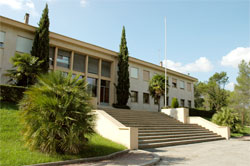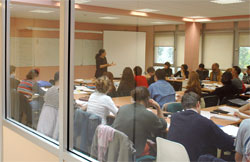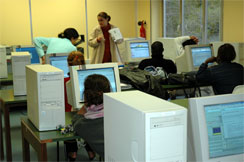|

|
CIHEAM
- IAMM
-
coordinator of FORMDER project -
(France)

|

|
|
| |
 Introduction Introduction

The
International Center for Higher Education of Mediterranean Agronomy
(CIHEAM), created in 1962, is an intergovernmental organization
that, by providing post-graduate training and developing research
networks, is a tool of cooperation between Mediterranean countries.
Its current priorities involve agricultural policies, rural development,
development engineering, food safety, and environmental protection.
The Agronomic Institute of Montpellier, one of the four CIHEAM
institutions, is specialized in economic and social sciences
applied to agriculture and the rural world.
 Activities Activities
CIHEAM-IAMM
has organized training at the Master’s level for forty
years in partnership with several training institutes and high-level
research institutes (CIRAD, ENGREF, CNEARC, the Universities
of Montpellier I and Montpellier III). It offers a Master of
Science degree in rural development, « Rural Development
and Planning », which accepts 15 to 20 students per year
from a dozen Mediterranean countries (Spain, Greece, Portugal,
Algeria, Morocco, Tunisia, Egypt, Turkey, Lebanon, Albania,
France, etc). IAMM training functions according to the European
credit hour system, where two credits represent 15 hours of
course work plus 30 hours of supervised work and practicum,
and teaching is organized in modules of 2 or 4 weeks.
In
addition, CIHEAM-IAMM has, for several years, coordinated research
projects in rural development in the Mediterranean
basin (study of the state of rural development in 12 Mediterranean
countries, focusing on Mediterranean rural development institutions
and organizations).
This
training aims to qualify teachers likely to work on rural
development projects in various structures (local collectives,
administrations,
NGOs, international organizations, research bureaus, etc).
 Teaching
team and equipment Teaching
team and equipment
The
IAMM teaching team is of international nature and is composed
of 12 teacher-researchers, 3 of which are specialists in
the area of rural development. In addition to this permanent
teaching team, supplemented by part-time lecturers, IAMM
is supported by a network of teacher-researchers in the region
(University of Economic Science, University of Humanities),
and in several other Mediterranean countries, as well as
a network of development professionals. Two of the teachers
speak fluent Arabic, and the entire teaching team speaks
average to good English. The entire teaching team is proficient
in computer technology and some of the teachers are proficient
in specialized data processing and financial assessment software.

IAMM
possesses 2 computer laboratories for courses (35 PCs in
total, equipped with different specialized software and
connected to the Internet) and 2 free-access computer laboratories
for students connected to the Internet. IAMM also possesses
a documentation center (48,000 reference materials, 310
periodicals, 500 audiovisual documents). Finally, the institute
possesses specific materials, such as 3 data shows, simultaneous
interpretation equipment, audiovisual equipment (TV, video
recorders, cameras) and visual conference equipment. The
institute also has a student hostel with the capacity of
accommodating almost 80 students.

 Interest
of FORMDER project for the institution Interest
of FORMDER project for the institution
Taking into account its history of cooperation in the area of
training and research on rural development, IAMM is an ideal
platform capable to conduct a liaison program between the post-graduate
training institutions in the Mediterranean basin. It has strong
links with the universities of the countries of southern Europe,
and also with partners on the south coast of the Mediterranean,
with which it maintains educational cooperation (joint training)
and scientific cooperation (common networks and research programs,
especially the RAFAC network projects, coordinated by IAMM).
It may, therefore, be the launching party and operating partner
of a program that will evaluate progress and needs, develop teaching
tools, and use new technologies to support education. CIHEAM-IAMM
has also for several decades been a place of exchange for agricultural
and rural development professionals in the Mediterranean basin.
This has led it to develop a diagnostic vision for the region
that will allow it to link the practices used in the Mediterranean
basin to scientific disciplines and methods. It is under these
conditions that high-level university training may allow both
the creation of a cooperative body in the region, by creating
a common scientific culture based on a common diagnostic, and
also by training high-level professionals to ensure that the
objectives set by the different Mediterranean countries for rural
development will be achieved.

|
|
|
|
|
|
